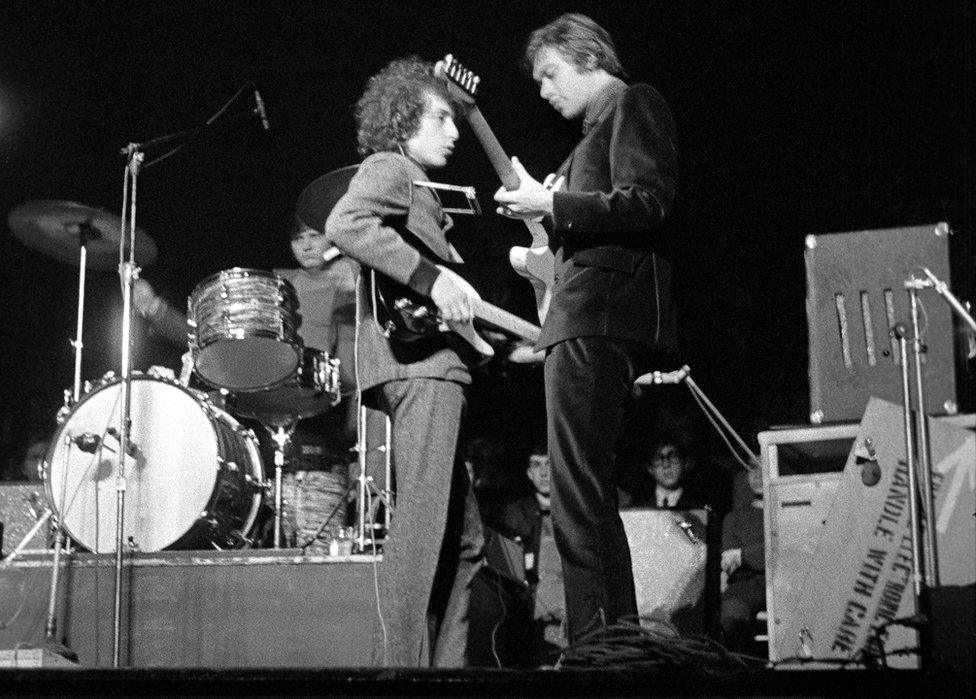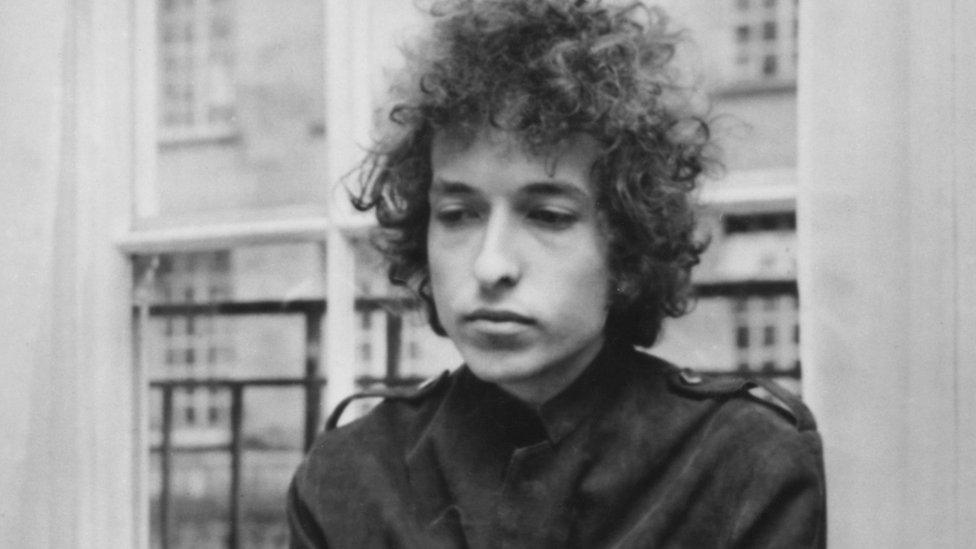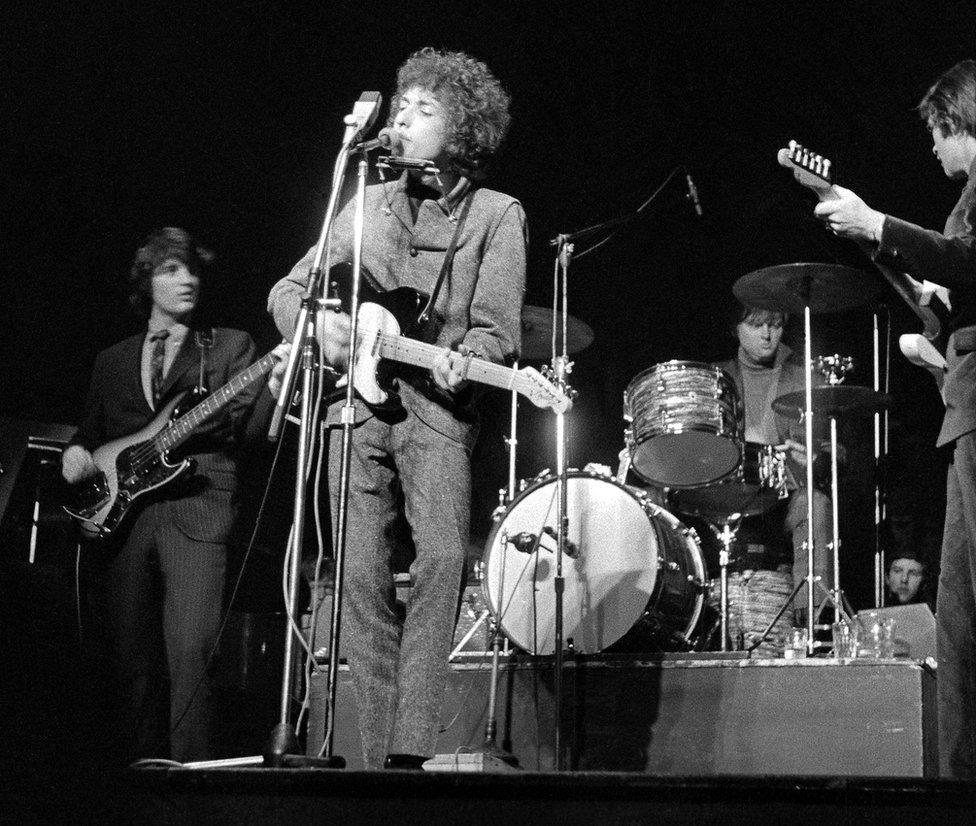Bob Dylan and the Manchester Free Trade Hall 'Judas' show
- Published
The heckle and Dylan's response were caught on tape and later released on a live album by the singer
Fifty years ago, Bob Dylan was at the centre of a storm, with arguments raging on both sides of the Atlantic about whether his decision to play electric sets meant he had sold out his folk roots.
The controversy began at the 1965 Newport Folk Festival in the US, where he was booed when he played electric and it came to a head, unexpectedly, towards the end of his 1966 world tour at a concert in Manchester on 17 May.
Frustrated by what he was hearing, one man decided to vent his fury as the sound ebbed before Dylan's final song of the set with a heckle that has become one of the most famous in musical history.
He shouted a single word - "Judas".
Musician and author Dr CP Lee was in the crowd that night and has since written a book about the world tour.
He says it has been "reckoned to be one of the pivotal moments in popular music in the 20th Century, on a par with the riot at Stravinsky's Rite of Spring in Paris".

Mark Makin took the only known photographs of the gig from his seat in the fourth row
At the time, he was a 16-year-old schoolboy, eager to see Dylan after missing his concert in the city the year before.
He says from the start, the gig had a distinct atmosphere and - with no pun intended - it was "electric".
"That night, standing outside, there were people arguing, lots of speculation and quite a sense of an impending event.
"We'd read in 1965 about booing at Newport and the impression we got was that Dylan had come back on with an acoustic guitar and everything was alright.
"The side door opened and in we went. We could see amplifiers and a drum kit on the stage and people were going 'oh no'.
"Some of us had read Melody Maker that week, which said there had been booing in Dublin and people wondered what Dylan was going to do."
'Bewildered, shell-shocked'
Mark Makin, who "by chance" took the only known photographs of the show, remembers the sense of "trepidation" but adds that it "wasn't as if people didn't know what was about to happen".
"We had all read that this was going to be electric. They were all just hopeful that it might not."
The gig had two halves: the first saw Dylan taking the stage alone and acoustic, while in the second, he played with the backing of his band, The Hawks.
Makin, who was in the fourth row with his school friends, says the audience was "delighted" with the acoustic set.
"Everybody was whisper quiet. These days, everyone roars with the recognition of the first line. It never happened then. You didn't dare miss a second of it.
"I suppose there was an expectation that he might not [play electric], he just might carry on - because we had such a good first half, he might just do more of the same."

Bob Dylan goes electric

Dylan found fame as an acoustic folk singer in the early 1960s. His first four albums had more chart success in the UK than in the US, with 1963's The Freewheelin' Bob Dylan reaching number one
He introduced an electric sound on his 1965 releases, Bringing It All Back Home - which had an acoustic and an electric side - and the fully-electric Highway 61 Revisited. They peaked at number one and four respectively in the UK
Dylan played an acoustic set on 24 July 1965 at the Newport Folk Festival before returning to play an electric set the following day
The set was met with a mixture of cheering and booing. Dylan and his band left the stage, before the singer was persuaded to return and play two acoustic numbers
He went on to face similar responses on his 1966 world tour, which used the same format of an acoustic set, followed by a electric show
His next five studio albums - Blonde On Blonde, John Wesley Harding, Nashville Skyline, Self Portrait and New Morning - all reached the top 10 on both sides of the Atlantic, with all but Blonde On Blonde hitting the UK top spot

Lee remembers people in the intermission "breathing a sigh of relief and I heard somebody say 'oh, he's seen sense. He's not going to use the band, he's realised he's wrong'."
Little did they know what was to come. Returning for the second half, Lee says drummer Mickey Jones "blasted into Tell Me, Momma [and] it was the loudest thing I'd ever heard".
He says that at the end of that first number, "people were bewildered, shell-shocked even", but shortly after, the protests began.
"Throughout the second half, people started slow hand-clapping. Groups of people were standing up, facing the stage accusingly and then walking out.
"There were random shouts here, there and everywhere."
And then there was a shout from the circle - "Judas". Lee says the heckle stung Dylan "to the quick".
"He lets the guy have it. You can really see that he has rankled Dylan.
"The look on his face... he turned around and said 'I don't believe you'. It was an incredibly antagonistic moment."
Lee says Dylan then stepped away from the microphone, swore as he told the band to "play it loud" and they "lurched into Like A Rolling Stone, which was this giant juggernaut".

Makin says Dylan's opening electric number - Tell Me, Momma - 'hit like a freight train'
Makin saw what happened in that second half differently.
"When he came on, he'd got a smirk on his face, because he knew what was going to happen.
"He'd had this elsewhere in the months prior to this and he had it completely under control and was not going to be dissuaded by anybody.
"He piled in with Tell Me, Momma, and it hit like a freight train, because it was a real rocker and screamer.
"People sat there stunned."
'I shouted Judas'
Makin points to a problem with the sound as the reason for the abuse Dylan received, an issue which it has also been claimed was behind the discord in Newport too.
"I think the problem was the Free Trade Hall's total lack of musicality - it was a square-sided building and when the sound was projected from a PA like that, it hit the wall at the back and came straight back at you with an echo and a reverb.
"All you could hear was this mush of sound. I think that was what hurt people.
"It wasn't that we didn't expect him to be electric, but if if he had just come in at three quarters of the decibels, it might have worked."
It is not known whether it was the electric set or the sound quality that vexed the famous heckler - in fact, as Lee explains, it is not even known for certain who shouted.
"Andy Kershaw and myself made a documentary for BBC Radio 1 in 1999 and were contacted by a guy who had emigrated to Canada called Keith Butler, who said 'yes, I shouted Judas'.
"But there was always an element of doubt. He had shouted something but I think he was confused about whether he had shouted that.
"After the broadcast, we got a call from a very irate person who said 'my husband shouted Judas and here he is now'.
"He was called John Cordwell. Andy and I met John and he had a lot of people who were with him who said 'yes, he shouted it out and we all applauded and thought he was great for having done it'.
"Sadly, both of them have passed away now, but it's funny - you wait 30-odd years for Judas to turn up and you get two at once."

Makin took an entire roll of film at the concert, managing to get 'about nine usable shots'
Lee says Dylan reacted so viciously because of the word used in the heckle.
"I think being called Judas was the point. Betraying what? It's quite ridiculous.
"That level of antagonism against an artist is unimaginable nowadays. It couldn't happen now - people would just either like it or not.
"This was not a bad set, it was absolutely fantastic what they played.
"It was eye-opening and revolutionary. I'm so glad there is a record of it."
The recording of the concert surfaced as a bootleg at the end of the 1960s and was officially released by Dylan in 1998.
Lee says it was an "incendiary" performance and that what happened that night - the heckle, Dylan's response and the ferocity with which he played the second half - changed music forever.
"In essence, it's the night that pop music became rock music.
"It was heavy metal, it was thrash metal, it was death metal, it was everything that's come since then.
"I was totally aware, the moment it finished, I knew I had been present at something that was seismic.
"I knew, from that night on, that things would never quite be the same again."
Electric 50, a celebration of the Free Trade Hall show by Manchester's musical community, takes place at Manchester Academy 3 on 17 May.
